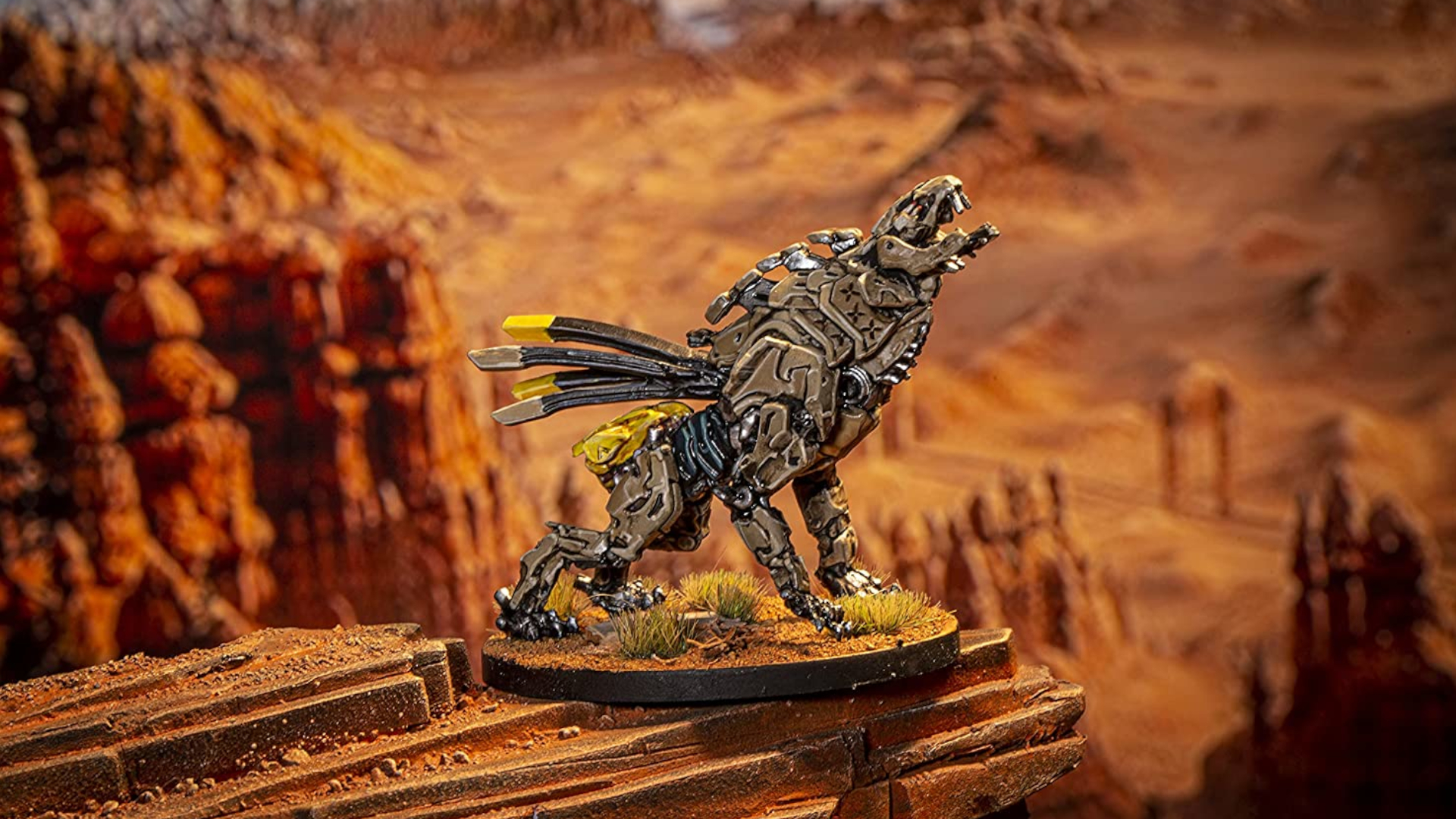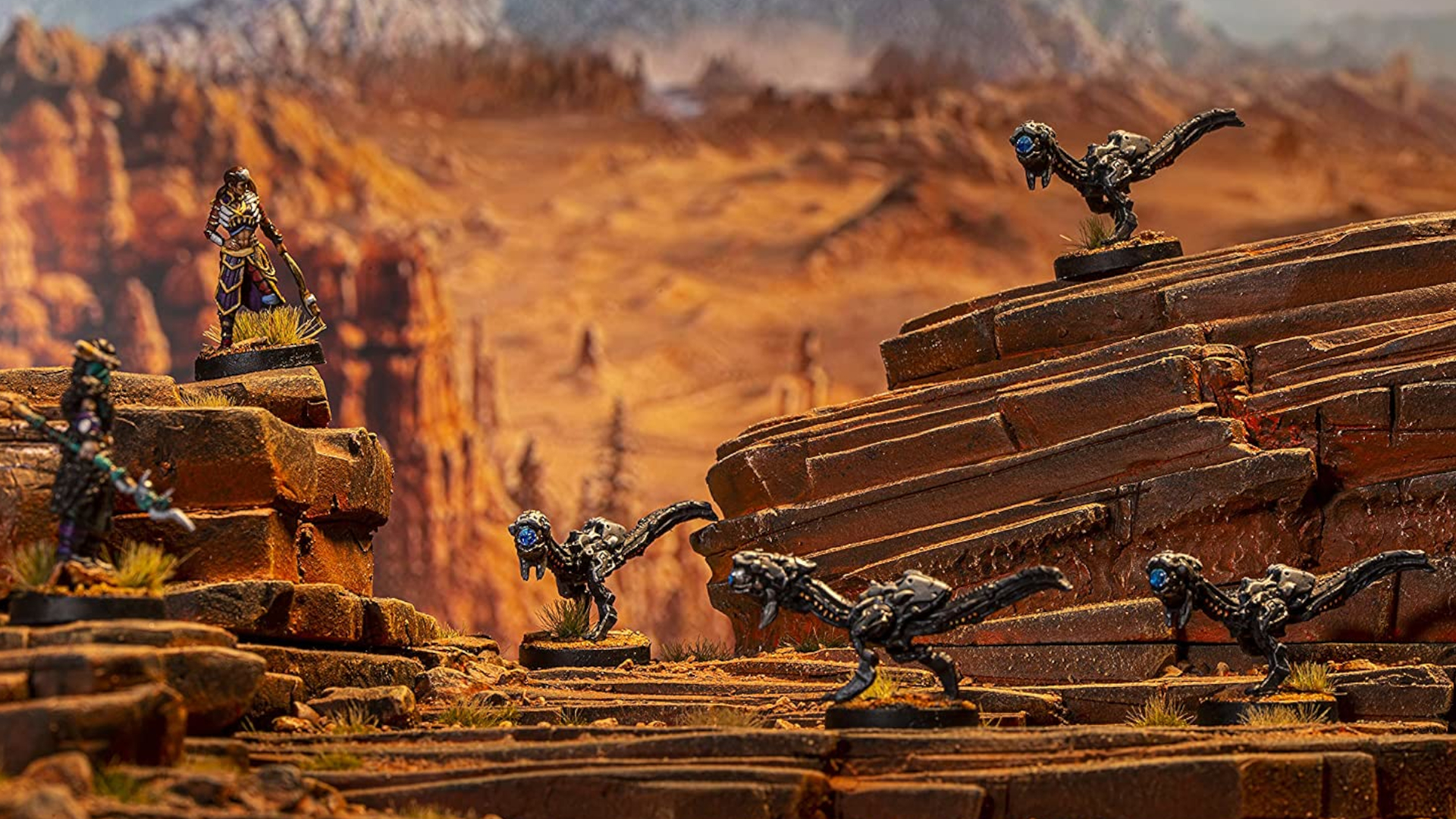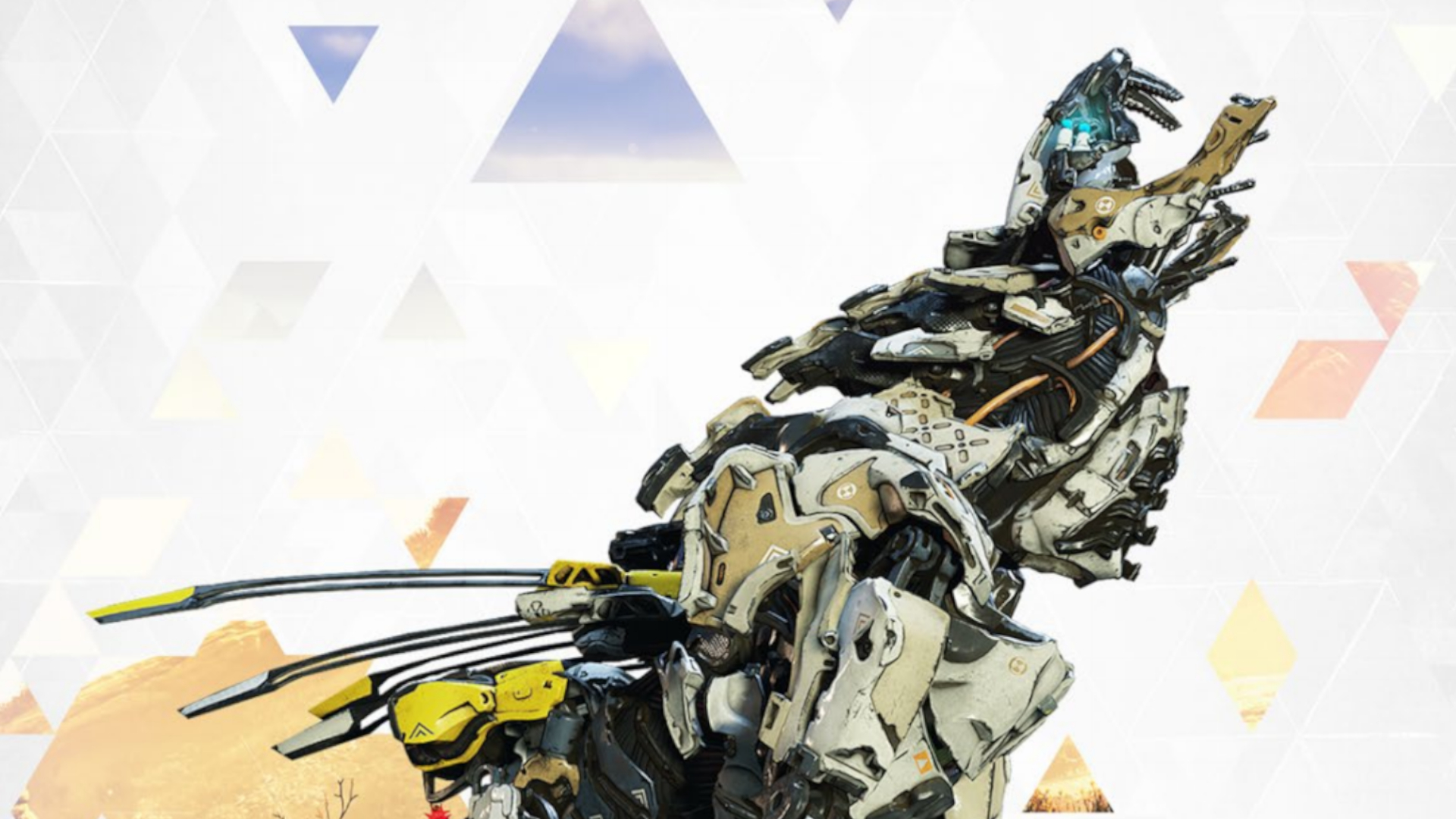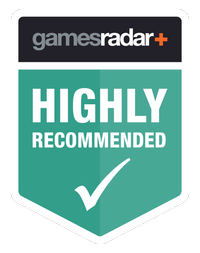GamesRadar+ Verdict
Once you've got it, the Horizon Zero Dawn board game is an excellent tabletop adventure that captures the video game's world and magic. Deep and multi-faceted in spite of a slow, head-scratching start, this game is an absolute joy.
Pros
- +
Exquisite miniatures
- +
Premium cards and tokens
- +
Rewarding and moreish
- +
Excellent balance of co-op and tense competition
- +
Great take on the source material
Cons
- -
Slow and tough to get into
- -
Instructions can feel impregnable
Why you can trust GamesRadar+
With Horizon Forbidden West on the, well, horizon, the Horizon Zero Dawn board game is extremely well placed to tide fans of the franchise over. Filled with intriguing cultures, beautiful, nature-reclaimed landscapes, and an array of robot dinosaurs to track, hunt, and scavenge from, this tabletop version translates the Horizon experience very well indeed.
The Horizon Zero Dawn board game sees one to four players take on the role of hunters in a post-post-apocalypse, banding together for a semi-cooperative journey with one 'meta' hunt peppered with a few smaller encounters along the way. That 'meta' hunt sees you taking on one of the largest beasts in the world - a fierce, noteworthy quarry for any hunter to bring down. This is the mighty Sawtooth in the base game, but other quests will come with expansions (more specifically, The Sacred Land boxset will launch September 14 2021 and features five new monsters). And because this is only the end goal, there's plenty to fill your time in-between starting the game and facing the Sawtooth itself.
Setting the scene
You won't be embarking on that journey with the video game's protagonist or supporting cast, though; the hunters of the Horizon Zero Dawn board game aren't named characters from the video game. Instead, they come from different tribes and offer unique specialisms.

Although all of them have access to a ranged and melee weapon, it's clear that some are better at one or the other. The Oseram Forgesmith is a fighter that puts more into double-handed melee, for example, while the Nora Marksman (who is closest to the franchise's main character, Aloy) is, as the name implies, a hunter with more of an aptitude for bows and ranged attacks.
However, it's worth noting that none of these really feel like the traditional tropes of barbarian, rogue, wizard, and so on. There are some similarities, but they largely stand on their own.
That theme remains throughout. This is because you'll be able to plan your hunter's journey through various upgrades and the skill tree branches that open up when you begin leveling. These offer ample replayability, as you'll only ever have two options for your next skill or ability to choose from - not everything is available to you in a single playthrough.
This is a moreish game you'll want to revisit once it has its claws in you
Fortunately, the act of picking your hunter isn't too arduous. A brief look at their skill tree may be sufficient to make your decision. Each is quite specialised, so it pays to read ahead on a character before choosing them so you know what you're getting yourself into (and to understand how their strengths and weaknesses dovetail with others).
Stalking your prey
Despite the game being an exercise of tracking and battling robot prey, that can't happen without solid preparation for your hunter - or for you. While the Horizon Zero Dawn board game is great fun in action, getting there can be a hurdle. There's a strong emphasis on the word 'detail' in the game's introduction, and you'll soon realise that this isn't an idle threat. You'll spend most of your first session (which will probably go beyond the somewhat optimistic 60 - 90-minute runtime) in a state of moderate confusion, and that can be off-putting. Namely - and like so many of the best board games, in all fairness - the instructions could be clearer. There were several times that I and other players were flitting back handfuls of pages to read up on something that was mentioned early but comes into effect late in the game.
Luckily, there are several 'eureka!' moments when playing for the first time. Plus, it's worth the effort. This is a moreish game you'll want to revisit once it has its claws in you, and the core loop - involving a randomised combat encounter followed by an upgrade phase, after which you start over - is a satisfying one.
Despite being a co-op experience, it's also got a competitive edge. Every battle requires a set number of Victory Points (earned by killing monsters) for you to proceed, but players can earn separate Glory points for their actions. This allows sneaky hunters to steal a kill from under their allies' noses. It's a fun juggling act; do you try and take out an enemy quickly to gain the Glory point for yourself, or do you work together to clear the map? This is a departure from what you'd expect in the best cooperative board games, and that's for the better.

This kind of tactical depth is a hallmark of the Horizon Zero Dawn board game. It translates the feeling of stalking your prey very well - not just in terms of positioning your hunters to do maximum damage, but noting what components on a monster can be targeted for extra Glory points and loot, or planning routes to get in range of your target while keeping an exit strategy in mind. In that way, it's just like the Monster Hunter World board game.
There's ample jeopardy, too. First, most of your enemies hit back. Hard. Because your hunter can't take a whole lot of damage and will faint if you endure enough knocks, charging like a bull in a china shop isn't an option. Enemy types also have their own traits and behaviours presented in a yes/no flowchart, so fighting each one is different - the same tactics won't work on everything.
If left to their own devices, your prey can actually leave the environment by following their patrol routes. This means you have to time your attacks well to ensure potential Glory, loot, and salvage doesn't literally walk off into the sunset.
Like the video game, unlocking new gear or skills immediately makes you eager to begin another encounter and test out your new gear
If it does, you lose out on one of the Horizon Zero Dawn board game's best bits - the final Campfire Phase. This represents the hunters gathering after an encounter to count their spoils, and it's where players level up and buy new gear for their next encounter. Like the video game, unlocking new gear or skills immediately makes you eager to begin another encounter and test out your new gear.
More importantly, it allows a stopping point if you want to take a break from your quest. Short on time? You can split your adventure into multiple parts, culminating with the Sawtooth battle after a few sessions. Alternatively, those who'd prefer to settle in can plow on with a mammoth, multi-hour game to tackle the Sawtooth sooner.
Although the choice is yours, it says a lot about the game that I immediately wanted to do the latter.
Overall - should you buy the Horizon Zero Dawn board game?
With four different hunters, a decent skill tree for each, and a bunch of different gear to buy at the end of every single encounter (of which there are many), there really is a lot to Horizon Zero Dawn: The Board Game. Once it clicks, it's great fun; more specifically, the loop of levelling up and wanting to get back out into the field is particularly well-executed.
Sure, being a big Horizon Zero Dawn fan won't make you an immediate expert in this game's strategy. But, boy, you'll be glad to play the tabletop version. It's fulfilling and translates the experience brilliantly.
Rob is the Deputy Editor of sister site, TechRadar Gaming, and has been in the games and tech industry for years. Prior to a recent stint as Gaming Editor at WePC, Rob was the Commissioning Editor for Hardware at GamesRadar+, and was on the hardware team for more than four years, since its inception in late 2018. He is also a writer on games and has had work published over the last six years or so at the likes of Eurogamer, RPS, PCGN, and more. He is also a qualified landscape and garden designer, so does that in his spare time, while he is also an expert on the virtual landscapes and environments of games and loves to write about them too, including in an upcoming book on the topic!





